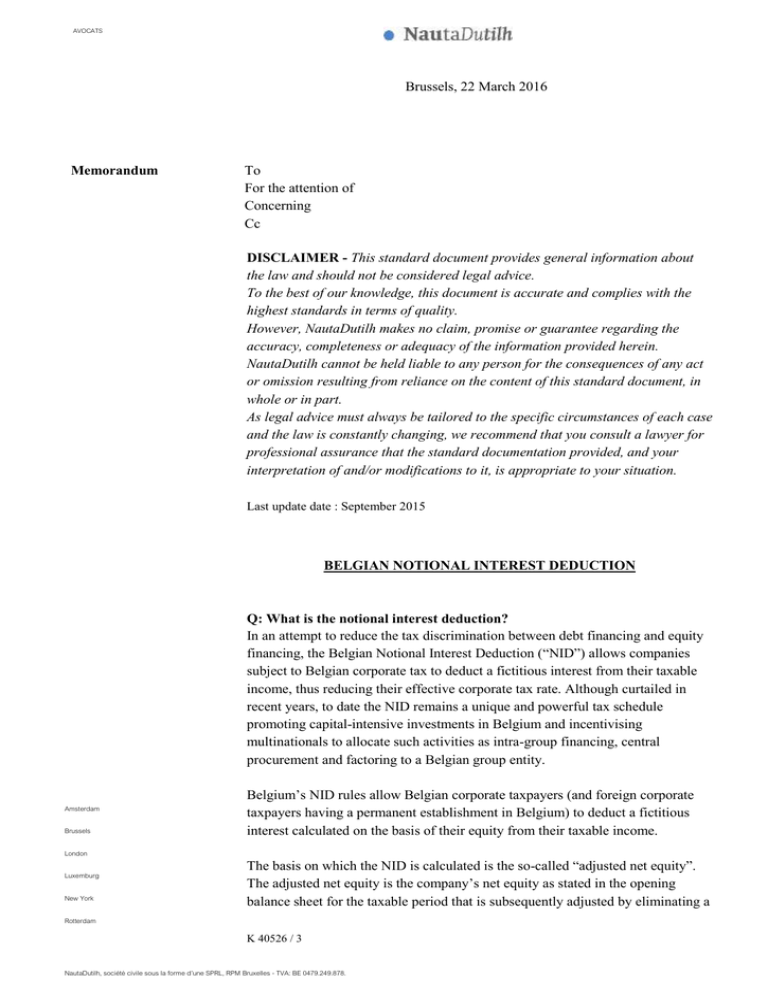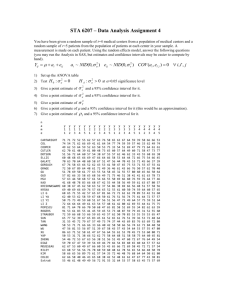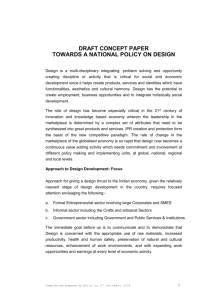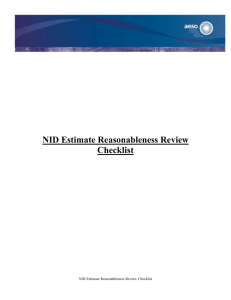Available for free. here.
advertisement

AVOCATS Brussels, 22 March 2016 Memorandum To For the attention of Concerning Cc DISCLAIMER - This standard document provides general information about the law and should not be considered legal advice. To the best of our knowledge, this document is accurate and complies with the highest standards in terms of quality. However, NautaDutilh makes no claim, promise or guarantee regarding the accuracy, completeness or adequacy of the information provided herein. NautaDutilh cannot be held liable to any person for the consequences of any act or omission resulting from reliance on the content of this standard document, in whole or in part. As legal advice must always be tailored to the specific circumstances of each case and the law is constantly changing, we recommend that you consult a lawyer for professional assurance that the standard documentation provided, and your interpretation of and/or modifications to it, is appropriate to your situation. Last update date : September 2015 BELGIAN NOTIONAL INTEREST DEDUCTION Q: What is the notional interest deduction? In an attempt to reduce the tax discrimination between debt financing and equity financing, the Belgian Notional Interest Deduction (“NID”) allows companies subject to Belgian corporate tax to deduct a fictitious interest from their taxable income, thus reducing their effective corporate tax rate. Although curtailed in recent years, to date the NID remains a unique and powerful tax schedule promoting capital-intensive investments in Belgium and incentivising multinationals to allocate such activities as intra-group financing, central procurement and factoring to a Belgian group entity. Amsterdam Brussels Belgium’s NID rules allow Belgian corporate taxpayers (and foreign corporate taxpayers having a permanent establishment in Belgium) to deduct a fictitious interest calculated on the basis of their equity from their taxable income. London Luxemburg New York The basis on which the NID is calculated is the so-called “adjusted net equity”. The adjusted net equity is the company’s net equity as stated in the opening balance sheet for the taxable period that is subsequently adjusted by eliminating a Rotterdam K 40526 / 3 NautaDutilh, société civile sous la forme d’une SPRL, RPM Bruxelles - TVA: BE 0479.249.878. 2 number of amounts. The balance is subsequently multiplied by a fictitious interest rate, which is 2,630% (3,130% for SMEs) for tax year 2015. The rate is 1,63% (2,130% for SMEs) for tax year 2016. The result is the NID that can be deducted from the taxable profit of the taxable period. Q: Who can benefit from the NID? All companies that are subject to Belgian corporate income tax or non-resident corporate income tax are, in principle, eligible for the NID. This means that inter alia the following entities can benefit from NID: Belgian corporations, Belgian branches of foreign companies and foreign companies that own real estate located in Belgium or hold property rights in such real estate. Some entities (that already benefit from certain other advantageous tax rules in Belgium) are automatically excluded from NID, such as shipping companies benefitting from Belgium’s tonnage tax regime or certain investment companies. Q: How does it work? The principle of the NID is very straightforward: the amount that can be deducted from the taxable base equals a fictitious interest cost on the adjusted net equity. Q: What is the adjusted net equity? The adjusted net equity is the company’s net equity as stated in the opening balance sheet for the taxable period (which includes according to Belgian GAAP, the share capital, share premiums, revaluation gains, reserves, retained earnings or losses and capital investment subsidies) that is subsequently reduced with a number of amounts: the fiscal net value of own shares held on the balance sheet; the fiscal net value of non-portfolio participations; the fiscal net value of treasury shares of which dividends distributed qualify for the Belgian participation exemption: the Act of 28 June 2013 abolished the requirement that these shares must be issued by investment companies.. This means that, as a result, as from tax year 2014 taxpayers are no longer allowed to claim both the 95% dividend received deduction (DRD) and notional interest deduction (NID) on treasury investments (shares, which qualify as cash investments according to Belgian GAAP). The DRD regime will prevail meaning NID can only be claimed for these investments if they are not eligible for DRD. Any change made to a company’s accounting reference date on or after 1 May 2013 will be disregarded for the application of this rule. the net equity assigned to foreign permanent establishments (in a country with which Belgium has concluded a tax treaty) or real estate property or K 40526 / 3 3 rights (regarding real estate located in a country with which Belgium has concluded a tax treaty): on 4 July 2013 the Court of Justice of the European Union (CJEU) ruled in the Argenta Spaarbank case (C-350/11) that excluding the net equity allocated to the foreign PEs of Belgian companies from the basis on which the NID is calculated violates freedom of establishment; the net book value of tangible fixed assets if their costs unreasonably exceed professional needs; the book value of tangible fixed assets that are considered as an investment not acquired in order to produce a regular income; the book value of real estate property or rights for private use (i.e. where its use is granted to directors, their spouses or children); and tax-free revaluation gains and capital subsidies as well as “mergergoodwill”. Any change to one of the abovementioned components during the taxable period is taken into account for the calculation of the NID on a pro rata basis. Changes, upwards or downwards, are recorded as of the first day of the calendar month following the month in which they took place. Q: What is the applicable rate? The NID rate is determined on average OLO rates (10-year linear bonds issued by the Belgian state). Initially determined annually and capped (from the previously applicable 6,5%) at 3%, the NID rate for tax year 2015 (accounting years ending between 31 December 2014 and 30 December 2015, both dates inclusive) is more closely aligned with the effective OLO rate by taking into account the average rate of the OLOs of July, August and September 2013 only. As a result, the NID rate for tax year 2015 is 2,630%. The rate is 1,630% for tax year 2016. SMEs are entitled to an upgrade of 0,5%, a result of which the applicable rate for tax year 2015 amounts to 3,130% for SMEs (2,130% for tax year 2016). A company qualifies as an SME if it meets the criteria mentioned in Article 15 of the Belgian Company Code. If the financial year of a company is shorter or longer than 12 months, the reference notional interest rate is multiplied by the number of days in this financial year and divided by 365. Q: What if the company does not make profit? The possibility to carry-forward excess NID for 7 taxable periods has been abolished as of tax year 2013. However, it is still possible to carry forward the unused portion of the NID built up under the previously applicable rules (the K 40526 / 3 4 “NID stock”), but certain restrictions apply (any NID stock carry-forward which is left over after the application of these limitations can be further carried forward, regardless of expiry of the previously applicable seven-year time limit): the NID stock carry-forward must be the last deduction taken on the corporate tax return to determine the tax base (in other words, all other deductions must be taken first, meaning the possibility to deduct the NID stock carry-forward will be severely reduced); and the maximum NID stock carry-forward that can be taken per tax year is limited to 60% of the tax base, not taking into account the first one million euros of the taxable base remaining before the deduction of the NID stock. Q: Are there other limitations on the use of the NID as planning tool? The notional interest cannot be deducted from so-called abnormal or gratuitous advantages received. Moreover, in case of a change of control or ownership over a company, the (restricted) carry-forward privilege for NID stock is only maintained when such a change can be justified by financial or economic needs. The Belgian tax authorities issued a series of circular letters to counter alleged abuse of the NID. Issued in 2008, AOIF/AFER circular no. 14/2008 summarises the (general and specific) anti-abuse provisions of Belgian tax law and explains how to apply them in the context of the NID. On 2 June 2008, a first addendum to the circular was published, consisting of a list of case law on the sham doctrine referred to in the circular. On 20 June 2011, the tax authorities issued a second addendum to the circular, based on cases of abuse of the NID identified during audits. This addendum describes two specific schemes for which the benefit of the NID can be denied, the first scheme involving so-called intra-group capital flows and the second scheme involving the conversion of shares with latent capital gains into receivables. On the positive side, the NID regime does not preclude a company from performing a particular business activity and no condition of investment in intangible or tangible assets, nor of blocking or freezing the amount on a separate account of the company’s balance sheet applies. The only formal condition to comply with in order to benefit from the NID is the completion of an enclosure with the corporate tax return. Although curtailed in recent years, to date the NID remains a unique and powerful tax schedule promoting capital-intensive investments in Belgium and incentivising multinationals to allocate such activities as intra-group financing, central procurement and factoring to a Belgian group entity. K 40526 / 3 5 For more information, please contact: Pascal Faes NautaDutilh BVBA/SPRL Partner T: +32 2 566 8612 F: +32 2 566 8613 M: +32 477 931 092 E: pascal.faes@nautadutilh.com The information and opinions expressed herein (the Information) are general in nature and are intended for informational purposes only. The information does not constitute tax or legal advice and may not apply to your specific situation, may be incomplete or may be outdated. You should not act or rely on (any part of) the Information and should seek the advice of an attorney before taking any action. The information contained in this document is up-to-date on 22 September 2015. K 40526 / 3






